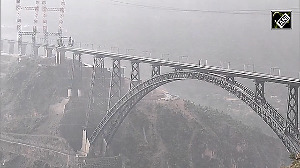Annan warned that a "second, massive" wave of death will sweep through devastated areas if the international community fails to contribute funds sought by the world body.
"There are no excuses. If we are to show ourselves worthy of calling ourselves members of humankind, we must rise to this challenge. Our response will be no less than a measure of our humanity," he stressed.
Annan made the appeal at an unscheduled press conference yesterday as UN humanitarian agencies warned that 10,000 children could die within the next few weeks of hunger and hypothermia in Pakistan. Besides, tens of thousands were in peril because of worsening weather, injury and illness.
So far, firm commitments for only USD 37 million, or 12 per cent, of the UN Flash Appeal of USD 312 million have been made. In comparison, the Indian Ocean tsunami Flash Appeal at the beginning of the year was 80 per cent funded within 10 days of the disaster.
Analysts attribute it to donor fatigue in a year which has witnessed several disasters.
Annan asked the international community to immediately provide 450,000 more winterised tents and temporary shelters and two million blankets and sleeping bags to help the victims of the quake which has already killed an estimated 42,000, injured 67,000 and left some three million homeless.
He urged key donors and organisations, including NATO and the OIC, to mobilise the assets of its member states to meet the unprecedented logistical challenges.
"We need helicopters, trucks, heavy lifting equipment, shelter and health care," Annan said. "We need tarpaulins, ground sheets and stoves. We need water and sanitation equipment. We need food supplies."
He said one of the lessons drawn from such experiences is that the UN should have a higher Central Revolving Fund, which will allow it to initiate operations very quickly.
"We have asked for a Revolving Fund of between USD 500 million and 1 billion. If we had those funds we could have moved very quickly and then replenish the Central Fund when contributions come in," he added.
Speaking about logistic challenges, Annan noted that thousands of people had still not been reached, and the toll could rise sharply as relief workers reach new areas.
"The people and government of Pakistan are faced with an extraordinary challenge and we need to make an extraordinary effort to support them," he said.
Annan urged governments to attend next week's donors meeting in Geneva to give urgency to the situation.
Painting an equally grim picture, UNICEF Executive Director Ann M Veneman warned that as many as 120,000 children in the mountains still lacked access to aid.
"Temperatures have dropped and weather conditions are getting worse," she said in Copenhagen, Denmark, where she was visiting the agency's global supply warehouse. "Tens of thousands of children are at risk."
Under current circumstances, even if tents and blankets were to arrive immediately, children would still be at serious risk due to a lack of medical assistance, dehydration because of bad water, and malnutrition.
"There is a significant threat of disease, with outbreaks of diarrhoea already reported," Veneman said. "Given the intermittent shut-downs of the air corridor because of bad weather, consequences for sick and injured children could be grave."
At the press conference, Annan said it was impossible for any picture to convey the sheer magnitude of the catastrophe and that in the most affected areas covering some 28,000 square kilometres of Pakistan, all essential infrastructure had been destroyed.
"That means thousands of hospitals and schools, government buildings and water systems, major roads and transport," he added.






 © 2025
© 2025